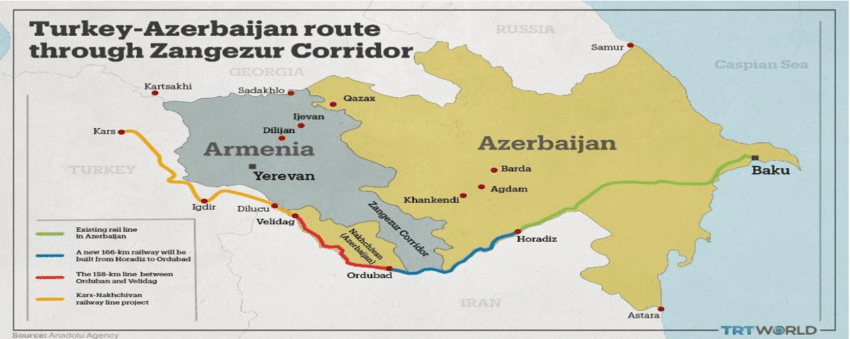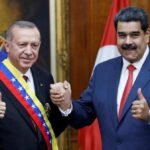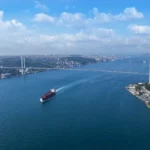Summary by News About Turkey (NAT):
Iran’s Supreme Leader Ayatollah Ali Khamenei reaffirmed Iran’s opposition to Azerbaijan’s proposal for the Zangezur Corridor, which would create a direct route through Armenia connecting Azerbaijan to its Nakhchivan exclave. Khamenei emphasized preserving Armenia’s territorial integrity, expressing concern that the corridor could isolate Iran from the Black Sea and disrupt the regional balance. Armenian Prime Minister Nikol Pashinyan also opposes the corridor, viewing it as a threat to Armenian sovereignty. The proposal has Turkish support, as it would enhance regional connectivity and economic interests, while Armenia fears potential Azerbaijani territorial claims.
Read more below.
Iran’s Khamenei reaffirms opposition to Azerbaijan’s corridor plan to Armenia PM
Iran’s Supreme Leader Ayatollah Ali Khamenei reaffirmed on Tuesday his government’s fierce opposition to Azerbaijan‘s efforts to establish a land corridor through Armenia that would connect it to Nakhichevan, a Soviet-era exclave on the Turkish border. The proposed scheme would effectively cut off the Islamic Republic’s access to the Black Sea while truncating its border with Armenia.
Khamenei “emphasized the importance of maintaining the territorial integrity of Armenia and affirmed that the Islamic Republic of Iran views the Zangezur Corridor as detrimental to Armenia, reaffirming its steadfast position on this matter,” read a statement posted on Khamenei’s website.
The statement went on that Pashinyan had aired his own opposition to the plan. Azerbaijan is demanding unfettered access through Armenia without being subjected to Armenian border controls. Armenia says such access would violate its sovereignty.
Azerbaijan’s top ally, Turkey, supports the transportation network, as it would connect Turkish exporters to Central Asian markets without having to go through Iran. Armenia’s official readout of the meeting made no mention of Zangezur.
Pashinyan was in Tehran to take part in the inauguration ceremony of Iran’s newly elected president, Masoud Pezeshkian. He was among the most senior figures representing more than 70 nations at the oath-taking ceremony, among them Turkish Foreign Minister Hakan Fidan and his Egyptian and Sudanese counterparts. It’s a delicate balancing act. Pashinyan is desperately seeking to move his country out of Russia’s orbit and bring it closer to the United States and the European Union. At the same time, he has made sure to keep relations with Iran, his country’s sole regional friend, on an even keel.
Pezeskhian has loudly trumpeted his roots in Iran’s ethnic Azeri minority. Azerbaijani President llham Aliyev invited the 69-year-old former heart surgeon to Baku in a congratulatory message following his victory. But the bonhomie masks deep tensions between the Caspian neighbors over Baku’s close ties to Israel and its thinly veiled threats to stir up ethnic tensions among Iran’s Azeris, as when it feels that Tehran is moving too close to Armenia.
Aliyev dispatched his prime minister, Ali Asadov, to the ceremony. Khamenei did not grant him an audience, passing him to Vice President Mohammed Reza Arif instead.
Differences over the Zangezur Corridor are among several reasons Azerbaijan is refusing to sign a peace deal with Armenia despite mounting pressure from the United States and the European Union to do so. Turkey says it fully supports Baku and has yet to establish diplomatic ties with Armenia and to reopen its land border with the small, landlocked former Soviet state that it sealed in 1993. The move was intended to show solidarity with Azerbaijan during its first conflict with Armenia over the Nagorno-Karabakh. Azerbaijan, which was roundly defeated in that war, emerged victorious from a 2020 war with Turkey and Israel’s help. Armenia fears that Azerbaijan will use the Zangezur Corridor to occupy Armenian territory separating it from Nakhichevan.
However, after a two-year hiatus, Turkey and Armenia’s special representatives for normalizing relations met today on the sealed land border, with separate meetings held first inside Armenia and then in Turkey. Turkey’s Serdar Kilic and Armenia’s Ruben Rubinyan confirmed the decisions made in their four previous meetings, according to a Turkish Foreign Ministry readout, which did not elaborate. However, Turkey had agreed in 2022 to open the land border to third-country nationals and to diplomatic passport holders but then dragged its feet, presumably under pressure from Azerbaijan. Rubinyan’s overland foray into Anatolia marks a first.
The Foreign Ministry added that the sides had decided to undertake a technical assessment of work needed to allow the resumption of rail links between the two countries. The ultimate goal, it stated, was to achieve full normalization “without any preconditions.”
By: Amberin Zaman
Source: Al – Monitor



